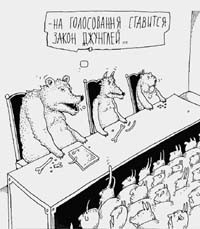It is not ruled out that the failed April 17 vote on the Election Law signals a new stage in the ongoing Ukrainian political intrigue. It would be good, of course, if this stage were not too long, for failure to pass this law could bring the political reform to a halt or, worse still, prompt the president to carry out this reform in an extra-parliamentary way.
Comments abound over what exactly happened in the session room. The most intriguing plot is unfolding about the president’s and the premier’s positions.
As is known, the president opposes this law. He puts forward an airtight argument: why should we pass a law on the election of nobody knows what? Indeed, it is not clear thus far whether this law will concern electing Verkhovna Rada, the National Assembly, or the Chamber of Regions. On the other hand, opponents believe that the adoption of a law on proportional representation would show the extent to which the government is prepared for a dialog in the name of political reform. The head of state’s behavior so far suggests that he wants to play on both sides of the fence.
The premier, who had allegedly promised to make the deputies he controls cast their votes for the law, failed to do so. A not always restrained Yury Lutsenko even took the liberty of saying the government “treats the opposition like dirt.” But he failed to guess — as always — that the government was right: how else should one treat the people brazen enough to show the whole country that they, people’s deputies, cannot read? On the other hand, a thick volume of the presidential address is by no means light reading.
So what exactly happened on April 17? An analysis of voting results leaves one dumbstruck. The law was supported by 217 deputies and opposed by 10, with 2 abstaining. Another 194 deputies did not vote. Therefore, the bill only ran short of nine votes to become a law. Here are the bare facts:
The law was supported by the opposition troika: the Communists (60 out of 60), Yuliya Tymoshenko’s bloc (17, with 1 absent), and the Socialists (19, with 1 abstaining). Between them, they held back only two votes.
Voting for the law were five independent deputies, as well as two members of Democratic Choice and five of the NDP. The behavior of these deputies (except perhaps the People’s Democrats) was hardly predictable, but their support had a strong effect on the overall result — but for them, there would have been 23 votes lacking.
Voting for the law were 14 Agrarian Party of Ukraine faction members, with two abstaining. It should be noted that members of this faction traditionally heed the premier’s opinion. Hence, a) there could not have been a deal whereby the premier promised the opposition to enlist the votes of Regions of Ukraine; b) even if there was a deal that a part of the majority would support the bill, it was by and large fulfilled.
The law was backed by 93 members of Our Ukraine, with nine (!) absent. What is more, nobody voted no. The nine deputies who were supposed to swing the vote to a positive result turned to be from Our Ukraine. The conclusion is that if Mr. Yushchenko talked less about his interest in the proportional representation law but worked more with his faction and paid more attention to elementary political discipline, we would have a proportional election law today. It will be recalled this is not the first instance when Our Ukraine’s uncoordinated actions torpedoed a vote: at the very beginning of the current parliament’s term, the opposition could have elected a leadership of its own, but Mr. Yushchenko was unable or unwilling to do so.
It can be said in conclusion: it is wrong to claim we mess everything up. Not always. Our deputies are quite capable of performing high-precision surgery. Albeit with an inevitably fatal outcome.







